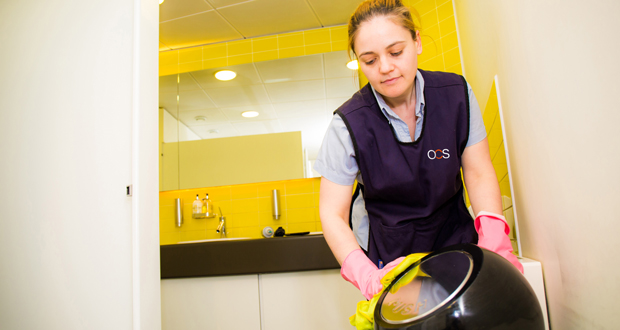By Yvonne Taylor, Global Head of Cleaning OCS Group
An estimated one trillion species of microbe live on earth, and about 15,000 different types of microorganisms live on and in the human body.
Most of them are harmless, and in fact, we couldn’t live without them. However, a relatively small number can give us serious trouble and cause irreversible damage to the body and even death.
They include SARS-CoV-2, the virus that causes Covid-19.
During the coronavirus pandemic, people’s attitudes to cleaning have changed. Throughout this time, we’ve been working with our customers to ensure their businesses are clean and safe, and to reassure their end users. And we’ve adapted our approach to reflect the most up-to-date information available to us.
We now know more about the virus – and how best to protect against it – than we did 12 months ago. In April 2021, the Centers for Disease Control and Prevention in the US updated its guidance to advise against disinfecting surfaces regularly. It deems the risk of contracting Covid-19 from surfaces to be ‘low’ and concludes that cleaning is enough to reduce this risk. Furthermore, it advises using disinfectants only when there have been suspected cases of Covid.
At OCS, we believe in taking all precautions to keep our customers and their customers safe – which is why we advocate targeted and considered disinfection such as rotational cleaning. Otherwise, there is a risk that harmful microorganisms could become resistant to disinfectant.
Cleaning vs disinfecting
Currently, there are two methods for controlling harmful microorganisms: cleaning and disinfecting. While cleaning physically removes germs, only disinfecting kills them. However, if we disinfect surfaces without following proper processes, only the weakest microbes will die, leaving the strongest to survive and multiply, making their population even stronger.
Unfortunately, in the wider cleaning industry, it is not uncommon to see:
- the wrong disinfectant being used
- the wrong dilution rate
- the misapplication of disinfectant – either inconsistently across the whole surface, using insufficient volumes or for an inadequate amount of time
- the use of disinfectants on unclean surfaces (some disinfectants are partly inactivated by specific dirt, and bio-films have to be removed before disinfection)
- the misapplication of disinfectant on to a clean but wet surface, leading to product dilution
Disinfection has saved many lives but disinfecting surfaces in the wrong way, or when it is not needed, can be dangerous. So, should we be disinfecting every surface daily? The simple answer is NO!
The only surfaces that should be disinfected daily are touchpoints. All other cleaning activity should be carried out in accordance with pre-pandemic guidelines.
The only time we recommend using disinfectant on all surfaces is if there has been a confirmed or suspected case of Covid-19 – when we suggest regular disinfection of all surfaces for a period of 14 days. And we recommend deep cleans only if you have had an outbreak of Covid-19.
Conclusion
The pandemic is a wake-up call. SARS-CoV-2 will not be the last unknown microbe that enters our safe and controlled world and disturbs it. There will be more, experts have warned us, and they could be even more harmful – which is why we need to control and limit our use of disinfectants and preserve their effectiveness for future outbreaks.
“Disinfection has saved many lives but disinfecting surfaces in the wrong way, or when it is not needed, can be dangerous.”
A trusted expert in the cleaning industry
At OCS, we’ve been cleaning for 120 years, working with customers in sectors including Aviation, Destinations and Venues, Healthcare, Government, Manufacturing and Professional Services.
We believe cleaning, like maintenance, should be preventative, not reactive. Our proactive approach to deep cleaning reduces the risk of onward transmission and infection by cleaning shared workspaces and touchpoints such as taps, handles and light switches. After a thorough clean, we will then work with you to design a schedule of deep cleaning to maintain standards of hygiene.
Our specialist biohazard teams are trained to deal with significant health risks, including confirmed cases of Covid-19. Our methods include fogging or electrostatic cleaning: the dispersal of micro-droplets of disinfectant and biocides into the air, which reaches areas not touched by conventional cleaning methods. We also offer environmental cleaning, kitchen deep cleaning, and hard-floor and carpet cleaning.
We provide sustainable solutions that reduce water and chemical use and have a low carbon footprint, using microbial and bio (green) products as much as possible and never phosphates or aerosols. We invest in the latest, most efficient cleaning technology such as footfall monitors to ensure our washrooms are maintained to the highest standards and hands-free robotic cleaners. Our processes and procedures are robust, which means our cleaning operatives are trusted by customers including the NHS. We keep hospitals hygienically safe, enabling healthcare staff to concentrate on looking after patients.
All our cleaning operatives are trained through our award-winning IMPACT cleaning programme, which includes an infection prevention module. We value the important work they do and recognise them through our OCS Stars award scheme and our participation in the annual Thank Your Cleaner Day initiative. We also look after colleagues’ physical and mental health through initiatives such as our employee assistance programme and mental health awareness training.
From our skilled colleagues on the frontline to our industry experts, we work with our customers to deliver the most efficient cleaning solution for their needs – one that keeps their premises hygienically clean and their people safe. By working in partnership with our customers, we can better understand how a space is used and identify the high- contact areas. This means we can propose a more efficient cleaning regime that delivers high standards of cleanliness and hygiene.
About the contributor
Yvonne Taylor started out in facilities management as a cleaner 26 years ago and joined OCS in 2015. As Global Head of Cleaning, she is responsible for ensuring we provide our customers with safe, efficient and sustainable solutions delivered by skilled cleaning operatives.
As a service expert, Yvonne sits on public bodies including The British Institute of Cleaning Science and the Cleaning and Support Services Association (CSSA). In her role as Board Director of the CSSA, she has been working to raise the profile of the cleaning industry, and she continues to call for cleaning to be recognised as a profession.





